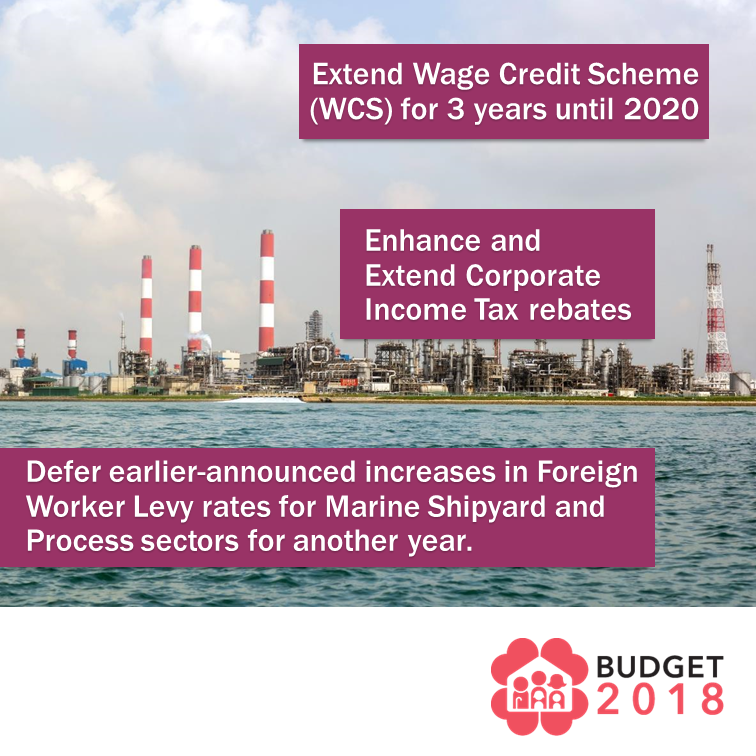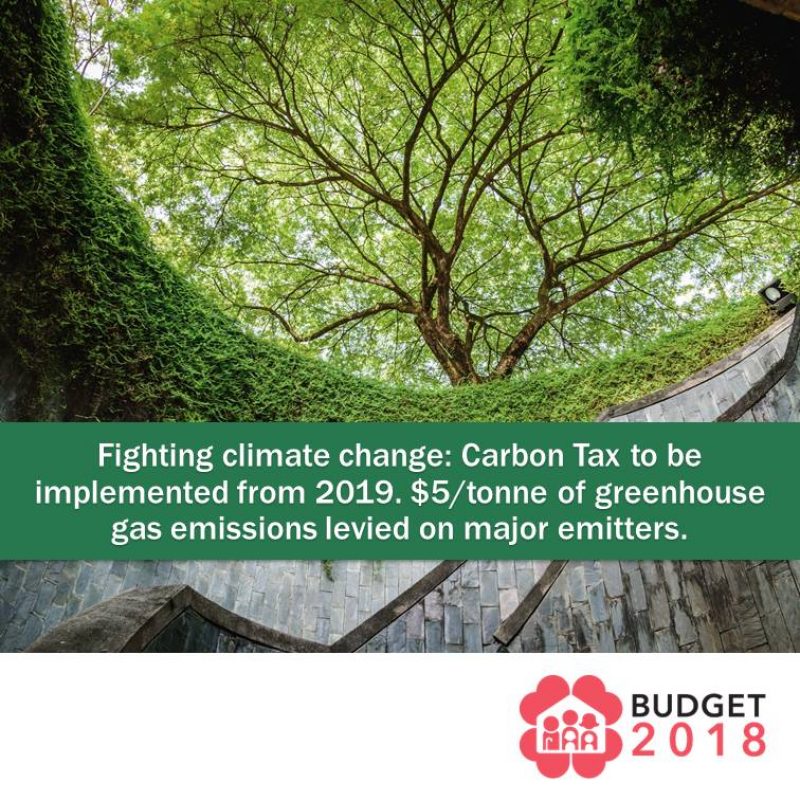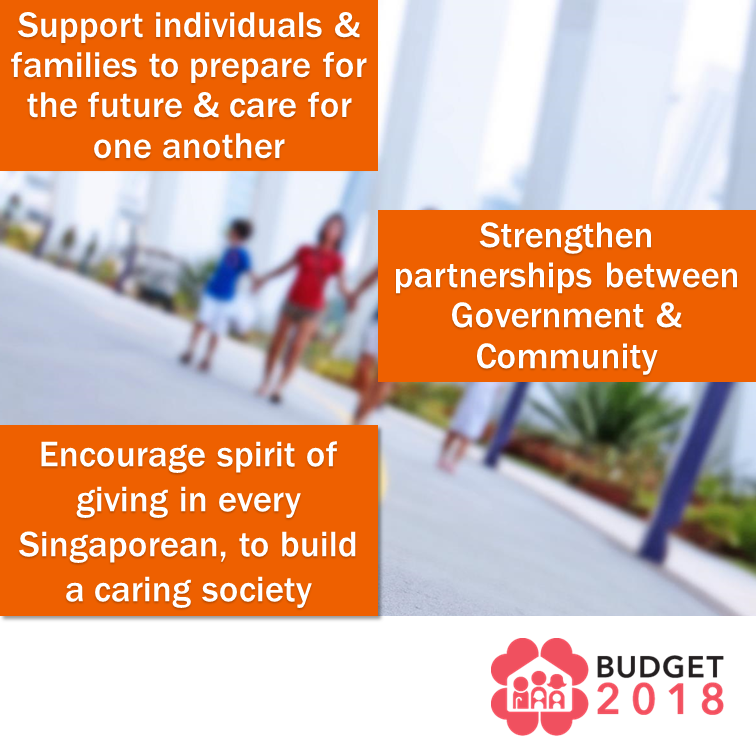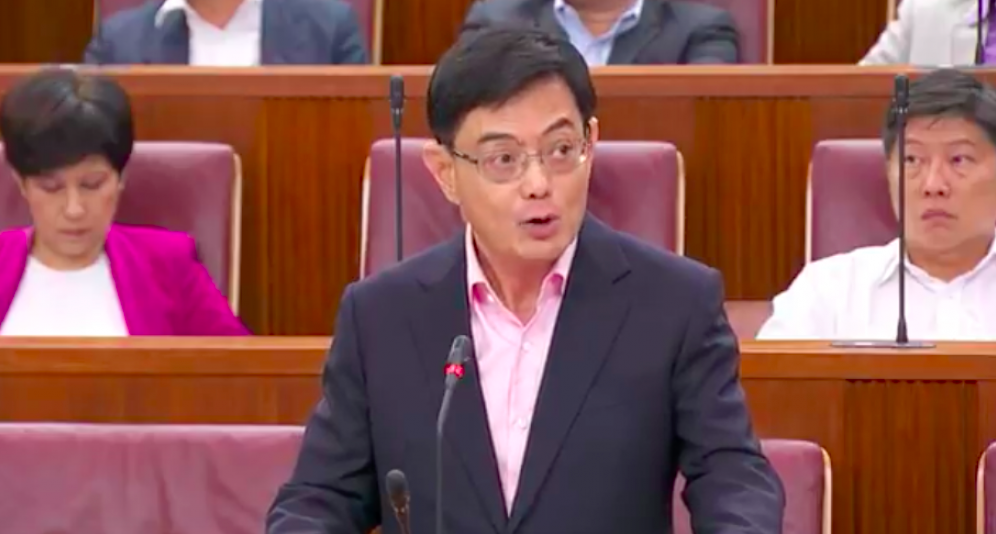It's that time of the year again.
Finance Minister Heng Swee Keat delivered the 2018 Budget statement at 3.30pm in Parliament today (Feb 19).
The aim of this year’s budget, themed “Together, A Better Future” is to prepare Singapore for three broad global shifts:
- First, the shift in global economic weight towards Asia;
- Second, the emergence of new technologies;
- Third, our ageing population.
Budget 2018 will address these shifts through the use of four strategies:
- Developing a vibrant and innovative economy
- Building a smart, green and liveable city
- Fostering a caring and cohesive society
- Preserving a fiscally sustainable and secure future
Let's show you what's new.
Vibrant and innovative Economy
There are lots of announcements in this budget that companies will like.
1. Help for companies
- The Wage Credit Scheme (WCS) will be extended for three more years.
It co-funds wage increases for Singaporean employees, up to a gross monthly wage of $4,000.
- The Corporate Income Tax (CIT) rebate will be enhanced and extended.
- Levy rates for foreign workers will remain unchanged across all sectors.
The earlier-announced increases for foreign workers in the Marine Shipyard and Process sectors will be deferred for another year.
 Pic from MOF's Facebook page.
Pic from MOF's Facebook page.
2. Boosting research
The government will also invest in innovation by expanding the National Robotics Programme, putting $100 million into a joint National Research Foundation-Temasek investment venture, and raising tax deductions on:
- IP registration fees, from 100 to 200 per cent.
- Qualifying expenses incurred on R&D done in Singapore, from 150 to 250 per cent.
Smart, green, liveable city
3. Carbon tax
Heng previously mentioned his preparations for implementing a carbon tax in his 2017 Budget Statement.
A carbon tax is levied on the carbon content of fuels to encourage companies and individuals to reduce carbon emissions in their daily activities.
This is in line with the country's ratification of the Paris Climate Agreement in 2016.
Singapore's carbon tax will include the following provisions:
- The tax rate will be set at $5 per tonne of carbon dioxide-equivalent greenhouse gas emissions ($5/tCO2e).
- The tax will be set from 2019 to 2023. The rate will be reviewed in 2023.
- Tax will be applied to all sectors, with no exemptions.
 Pic from MOF's Facebook page.
Pic from MOF's Facebook page.
These measures are intended to contribute to the fight against climate change. As a tropical, low-lying island, Singapore is very vulnerable.
With the revenue raised, the government intends to help companies become more energy-efficient.
[related_story]
4. Smart Nation
The government will introduce several strategic national projects, including:
- Sensor Platform for "Internet of Things" devices to enhance municipal service delivery.
- National Digital Identity system to enable citizens to authenticate identities for online transactions.
- Adoption of e-payment system, island-wide.
- Open up digital platforms for the private sector to build innovative services.
Caring and cohesive society
 Pic from MOF's Facebook page.
Pic from MOF's Facebook page.
5. Increased support for education
- Increased annual Edusave contributions, with effect from Jan. 2019.
- Updated income eligibility criteria for the Edusave Merit Bursary and the Independent School Bursary.
- Increased support for students from lower-income families.
6. Enhanced Proximity Housing Grant
- PHG for families buying a resale flat to live with their parents or children will be increased to $30,000.
- PHG for a resale flat to live near their parents or children will continue at $20,000.
Sustainable fiscal future
7. GST for the Digital Economy
With effect from Jan. 1, 2020, a Goods and Services Tax (GST) will be introduced on Business-to-Business (B2B) and Business-to-Consumers (B2C) imported services.
Some of the services that will be affected include:
- B2B -- Marketing, accounting, IT and management services
- B2C -- Video and music streaming, apps, listing fees on e-marketplaces and online subscription fees
This is to ensure that GST applies to services consumed in Singapore, whether it was bought from local or overseas suppliers.
However, e-commerce for goods will not be affected.
Currently there is no GST on low-value goods (worth below $400), but the government is still considering whether to impose it or not.
8. GST Hike
There will come a day where the GST rate will be raised. It is not this day, but now we know when it's likely to be implemented.
GST will be raised by not one but two percentage points, from seven to nine percent, sometime between 2021 and 2025.
However, the government will continue to absorb GST on publicly-subsidised education and healthcare.
There will also be an offset package and an enhanced GST voucher to provide more help for lower-income households and seniors.
Hong baos!
But there are still goodies to expect.
Heng announced an SG Bonus, due to a budget surplus in FY2017.
- Every adult Singaporean will receive a special cash payment of at least $100 in 2018.
- Those with an Assessable Income from $28,001 to $100,000 will receive $200.
- And those with an Assessable income of not more than $28,000 will get $300.
Top image from SingaporeBudget.gov.sg
(Update: This story has been updated at 2355hrs on Feb. 21 to reflect that the new rate of deductions for qualifying expenses incurred on R&D done in Singapore is 250% and not 200%)
Here are some totally unrelated but equally interesting stories:
If you like what you read, follow us on Facebook, Instagram, Twitter and Telegram to get the latest updates.
